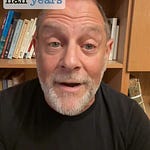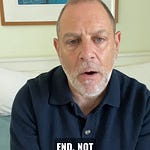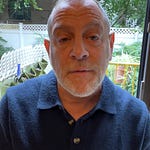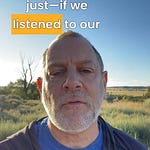Playback speed
×
Share post
Share post at current time
Share from 0:00
0:00
/
0:00
Transcript
"And yet you expect to inherit this ancestral land?!”
Weekly Vid Recap of Below the Bible Belt
Dec 15, 2023
“To us injustice is injurious to the welfare of the people; to the prophets it is a deathblow to existence: to us, an episode; to them, a catastrophe, a threat to the world.”
Abraham Joshua Heschel, The Prophets
Can the prophetic voices within and among us help us hear and speak the tough truth?
They - we - must.
As we make our way through the chapters of Ezekiel’s prophetic words and visions it’s impossible to avoid the timely and timeless echoes of these ancient passages - for our private and personal sides, and from a public-political perspective. Ezekiel laments and rages at his 2,600 years old reality - but many of the horrors he experiences and rebukes are as tragically vivid and violent today.
What are we to make of these old-new lessons? This week, as we wrap up Hanukkah, and while this brutal war keeps on claiming lives, sowing despair and adding hurt to hurt in this humanitarian disaster -- perhaps we can listen to what he has to say about humility, about humanism - and hope.
Ezekiel spent much of this past week railing at the great kingdom of Egypt, the neighbor to the South of Judea, with the Pharaoh as the great serpent in charge, full of hubris and excess, minding its own business - Egypt First -- declining to rescue Jerusalem and watching as Judea was demolished by Babylon.
But the harshest words of Ezekiel were reserved this week not for Egypt but to the remaining Judeans, survivors in Jerusalem, in the aftermath of the temple’s destruction and the killing of Judah's last king.
Ezekiel is furious at the survivors of Jerusalem who claim that they are the only ones to perpetuate the legacy of Judaism, on their land, even as an occupied people, even as their own immoral conduct and political approach led to the horrendous siege and destruction. Ezekiel represented the exiled Judeans - the ones who got away - now living in Babylon as refugees. His position articulated the diaspora perspective emerging - that there could be many ways to celebrate Jewish identity - not just in the holy land, and not just with nationalistic zeal.
So it’s within this framework that Ezekiel quotes the claims of the Judeans left behind in the ruined Jerusalem - and counters their claims:
בֶּן־אָדָ֗ם יֹ֠שְׁבֵ֠י הֶחֳרָב֨וֹת הָאֵ֜לֶּה עַל־אַדְמַ֤ת יִשְׂרָאֵל֙ אֹמְרִ֣ים לֵאמֹ֔ר אֶחָד֙ הָיָ֣ה אַבְרָהָ֔ם וַיִּירַ֖שׁ אֶת־הָאָ֑רֶץ וַאֲנַ֣חְנוּ רַבִּ֔ים לָ֛נוּ נִתְּנָ֥ה הָאָ֖רֶץ לְמוֹרָשָֽׁה׃
עֲמַדְתֶּ֤ם עַֽל־חַרְבְּכֶם֙ עֲשִׂיתֶ֣ן תּוֹעֵבָ֔ה וְאִ֛ישׁ אֶת־אֵ֥שֶׁת רֵעֵ֖הוּ טִמֵּאתֶ֑ם וְהָאָ֖רֶץ תִּירָֽשׁוּ׃
“Listen O mortal, those who live in these ruins in the land of Israel argue, “Abraham was but one man, yet he was granted possession of the land. We are many; surely, the land has been given as a possession to us...
You men have relied on your sword, you have committed abominations, you have defiled one another’s wives—yet you expect to possess the land!”
Ezekiel 33:24-26
The Hebrew ‘Morasha’ is translated here as ‘possession’ or ‘posses’ - - and elsewhere as ‘inheritance’, or ‘legacy’. It is the loaded term that attests to the historical relationship between the Jewish people and their homeland.
Ezekiel doesn’t challenge the ancestral link - but is very clear in his condemnation of his siblings- the survivors who have chosen to - or had to - stay behind in Judah, without sovereignty - for the first time in many hundreds of years:
Sorry family - he says, but you don’t get to keep the land if your conduct is immoral - sexually, morally, spiritually and politically. There ARE consequences to the centuries of your abuse, and all the prophetic warnings you ignored. He is speaking, it’s important to remember, on behalf of God.
Reading this in 2023 is painful and important just as it must have been a challenged and unpopular prophetic call back then.
Did the people back then hear him? He tells us that they did not.
Can our people hear these words today?
Can we take a note from the prophet for whom each form of injustice is a disaster and speak up before it is too late?
These questions linger in my heart as we prepare to enter this shabbat, mid-war, ahead of longer nights and the longest one of the year, with hopes that light can grow and truth can be heard and changes be demanded - for everybody’s sake.
Thank you for joining me below the bible belt with the zeal of Ezekiel.
May there be hope and healing.
Shabbat Shalom.
Recent Posts









